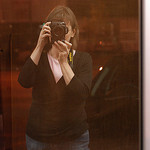So, Izzy and I are sitting here watching "the Wonder Years," when a commercial comes on there an announcer reads:
(In case we weren't sure what we were hearing, the letters flashed up on the screen.) Here's a screen shot from their website:Eat all you want and still lose weight.
Eat all you want and still lose weight!
And remember, we couldn't say it on TV if it wasn't true!

So, what might be wrong with these claims?
Claim 2: We couldn't say it on TV if it wasn't true!
a. ... if it weren't true... (grrr---Would that there were more subjunctive police.)
b. If you've ever seen "Believers' Voice of Victory,"you'll know that you can spout all sorts of bogus stuff on TV.
c. Addressing the logic side of things, if Claim 1 is proved false, then Claim 2 becomes false.
Claim 1: Eat all you want and still lose weight
a. This brief commercial for a new wonder supplement was followed by a full minute of advertising for Jenny Craig. Then two other commercials for diabetes-related products. (What does this say about the audience for "The Wonder Years?")
b. So, even the Ion network doesn't think that this needs to be their only source of weight-loss advertising.
From their website: "These statements have not been evaluated by the Food and Drug Administration." So, if not the FDA, who exactly polices what can be claimed on TV? Turns out, pretty much no one, so long as your product is marketed as a dietary supplement. I wonder what-all they'd have to put in the disclaimer if it were a "drug"?
Worth a look: The FTC actually created a fake weight-loss product site, as a consumer education tool. Pretty well done: Fatfoe.





No comments:
Post a Comment